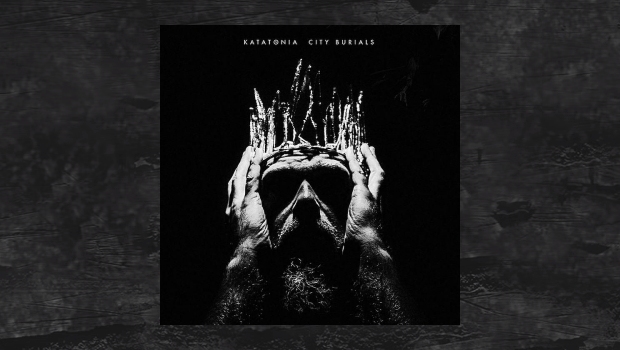There is a significant difference between a concept album and the concept of an album. It is not a distinction which had previously caught my attention until I read a recent interview with Katatonia’s vocalist Jonas Renske. Comparing ‘our’ generation with the younger generation (his own children included), Renske believes we still harbour expectations for ‘great’ albums. The younger generation, however, “just listen to the same songs over and over again. The album as a concept is unknown to them.”
Far from wanting to change this, Renske is adamant we have to “respect” it. “Hopefully”, he says, “if people hear a song on this album and they like it, they might try a few more!” That enduring vision of the organic evolution of music opened my eyes not just to the fundamental connections which hold Katatonia’s nearly 30-year journey and 10 album catalogue together, but also shed light on the progress and development of a whole host of other bands as well.
Recent albums have seen Katatonia gradually expand their reach beyond the extreme metal origins for which they are primarily known. The Fall of Hearts, released in 2016, was a bold and adventurous step into ‘progressive’ territory. The gritty, muscular power of their metal origins remained as the bedrock of the band’s sound; but to their traditional, melancholic atmosphere they infused a new emotional and melodic subtlety, highlighted with rich harmonies and a more diverse array of vivid and variable arrangements.
City Burials continues to fearlessly ride the natural momentum generated by that release, whilst in the process digging even deeper into their existing history. Renske has written all of the lyrics along with most of the music and this exclusivity perhaps explains what is instantly noticeable when you first hear the album; to the harmonies and arrangements, there is now more guile, more nuance, more focus on transitions and on the movement and timing of the music across the duration of songs.
Long-time fans of the band will immediately feel at home with Behind the Blood; a heavy riffing, Judas Priest-like opening sets up a strong, pulsating beat. Infectious melodies are carried on the momentum of layered, relentless guitars. You know you are at home with Katatonia as you pump your fist to “You’re a torch to the temple of depression”.
Rein echoes those same heavy origins; almost playful djent signatures cast a leaden, sombre atmosphere where it feels as if the band are making a Herculean effort to even play the notes. The song transits between shifting rhythms whilst delving chord sequences weave curtains of impenetrable musical darkness. Shards of sun occasionally break through sultry skies as a solo vocal with a faint melodic echo brings relief in a soundscape that threatens to overwhelm. Distorted fuzz accompanies a thunderous vocal climax.
Don’t be fooled, however. Each song carries crafted musical transitions, vividly contrasting against the stunning canvas of an inky deep soundstage. Cavernous spaces echo with piercing emptiness, resonating with nuances – the perfect palette for painting aching melancholy, profound despair and the ever-shifting turmoil of emotions. Love, joy, loss and sadness. They are the torchbearers for profound fragility and vulnerability, remorse and regret. Time passes. And then we die. Beautifully tragic and horribly heroic at one and the same time.
Track one, Heart Set to Divide, opens with haunting, layered melodies, transitions to an almost jaunty, playful but insistent guitar before transiting again to a forlorn echoed vocal against asynchronous drum beats. The progression completes with a full melodic refrain, with the motif picked up again in Lachesis where simple, melodic harmonies dance and entwine against a solo soulful piano.
But even this is an appetizer to the progressive aspects yet to come. Lacquer is deliciously delicate even when rumbling with menace. A simple plucked opening serves to accompany a wistful voice painting gentle but ghostly lyrical vignettes. The Winter of Our Passing is a wonderfully simple composition, but filled with rich contrasts of vocal instruments and shifting musical backgrounds speaking of solitude and loneliness.
Track of the album for me is Vanishers. Rending, penetrating, existential lyrics convey the sadness of death, the reducing of all our bluster and efforts to nothing. We thought we ruled the world, we believed we were the centre of the universe. Death, quickly, reduces it all to nothing. We come; we go. Vanishers.
The majestic City Glaciers and the closing Untrodden are as anthemic in their refrains and brilliant in their instrumental prowess as they are cloaking a hard-nosed lyrical realism. When taken together as an album, the songs seamlessly link and transition to form what is a progressive masterpiece. Herein lies the brilliance of Renske’s vision: the concept of an album as the Trojan horse which allows you to deliver the full force of a concept album to which many may otherwise not listen, delivered by a band with an ever-increasing appetite to explore new boundaries and possibilities. Absorbing.
TRACK LISTING
01. Heart Set To Divide (5:29)
02. Behind The Blood (4:37)
03. Lacquer (4:42)
04. Rein (4:21)
05. The Winter Of Our Passing (3:18)
06. Vanishers (4:56)
07. City Glaciers (5:30)
08. Flicker (4:45)
09. Lachesis (1:54)
10. Neon Epitaph (4:32)
11. Untrodden (4:29)
~ Bonus Tracks (available on various formats):
12. Closing Of The Sky (5:26)
13. Fighters (3:37)
Total Time – 57:36 (with bonus tracks)
MUSICIANS
Daniel Moilanen – Drums
Anders Nyström – Guitar, Keyboards, Backing Vocals
Roger Öjersson – Guitar
Jonas Renkse – Vocals, Keyboards
Niklas Sandin – Bass
ADDITIONAL INFO
Record Label: Peaceville
Formats: CD | Deluxe Mediabook C | Black & Coloured Vinyl with Bonus Track | Digital
Country of Origin: Sweden
Date of Release: 24th April 2020
LINKS
Katatonia – Website | Facebook | Twitter | Youtube | Instagram | Soundcloud

